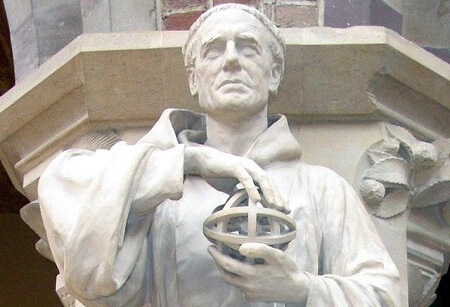 Roger Bacon Roger Bacon Most of the fathers of modern science were Christians of some sort and believed in the God of the Bible, many of them believed in a six-day creation, but it should also be noted that in some cases the seeds were sown in the 17th century and earlier for the apostasy that came in the 19th century in the form of theological liberalism and Darwinian evolution. Some of the very men who were influenced by a biblical worldview and did a lot of good in the field of science also entertained incipient strains of skepticism that eventually bore bitter fruit. This reminds us of the truth of Galatians 5:9, “A little leaven leaventh the whole lump.” Consider, for example, Roger Bacon, who is known as the father of the scientific method. A Roman Catholic friar, he wrote against atheism, rejected Aristotle’s philosophy which was promoted in English universities of that day, believed in a six-day creation, and said that human knowledge should redound to the glory of God. But he also set the stage for a rationalistic approach to science with his method of investigation in that he taught that man must depend upon his own investigations rather than any other authority, including divine revelation. He said it is “folly” to “build a system of natural philosophy on the first chapter of Genesis, the book of Job, and other parts of Scripture; seeking thus the dead amongst the living” (Bacon, Novum Organum). Bacon encouraged scientists to throw away all prior certainties, which would include the Bible, as well. ‘If a man will begin with certainties, he shall end in doubts; but if he will be content to begin with doubts, he shall end in certainties” (Ibid.). This is a denial of the superiority of God’s Word over human observation and a blatant rejection of the necessity of faith (Hebrews 11:6). Bacon held the great error of compartmentalizing religion and science. He said that the Bible should be trusted in matters of the spirit, but science in matters of the physical world, ignoring the fact that the Bible has a lot to say about the physical world, such as how it originated (Genesis 1:1) and how it consists and is upheld (Colossians 1:17; Hebrews 1:3). As Carl Wieland and Jonathan Sarfarti observe, “Bacon’s stance paved the way, first, for old-Earth geologists to reject the Flood and Biblical chronology in Genesis 11. And then, for Darwin to undermine the Bible completely, since Darwin expressly applied the Baconian method to biology” (Wieland and Sarfati, “Culture Wars: Bacon vs. Ham, Part 1,” creation.com). (Friday Church News Notes, January 22, 2016, www.wayoflife.org, [email protected], 866-295-4143) Comments are closed.
|
Archives
February 2020
|
Ads do not imply endorsement | Policy/Terms of Service | About Us | Contact Us | © Life Work Academy, Inc.
 RSS Feed
RSS Feed

